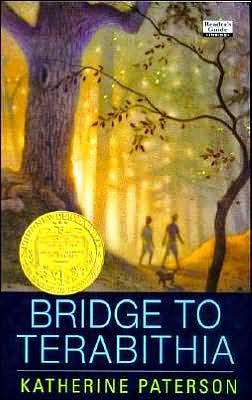“I try very hard to stay away from the word ‘message,’ because I think it’s poison in fiction. I think you tell your story and then the reader gets to decide what he or she will learn from your story. And if they don’t want to learn anything from it, that’s their choice.” – Katherine Paterson, author of Bridge To Terabithia, in an interview on NPR.
Agree or disagree?


Both.
Agree, because I’ve read some novels and had the enjoyment stolen by the author’s need to Tell Me Something Important (to them).
Disagree because it’s that something deeper which can turn an average novel into something I remember for years. Like Bridge to Terabithia, the first novel which ever made me cry.
Depends. If its a romance exploring a couple’s struggle to remain loyal–that’s an acceptable message. If its a book about a guy who wrote home for a wife, wrote the wrong name, then sucked it up and married her afterward–that’s an acceptable message. The message IS the story.
I don’t mind an author pontificating about philosophy or some such, as long as it’s interesting and thoughtful. But the first message that turned me the heck off was the last chapter of the Rolling Stones by Heinlein. He always does get preachy, though.
I agree with Iola! BTW, “Bridge to Terabithia” was amazing!
I despise books or movies that are there to promote an agenda. If I paid $100 to go to a concert and the singer stopped int he middle to deliver a campaign speech for their favorite candidate, I would be livid.
I’ve tossed iconic writing help books because the author has to cram their political dialogue into the book.
I buy a book to be entertained or informed.
Someone told me my book would send a nice message about how women can… Um, no. I’m not writing for a cause, I’m writing interesting people.
You’d have to parse the meaning of message. Every good story or novel delivers a message of some sort. Being subtle, nuanced is the key
I think what an author thinks about life, relationships, and the world should be an organic thing, rather than a discourse. I dislike novels with sermons. I’d rather extract the author’s views from the plot and what happens to the characters as a result of the decisions they make. I call sermonizing ‘The Teaching Trap’ and so many writers fall into it.
I recently unfollowed a very very famous thriller writer’s professional page for his unrelenting anti-Obama posts. Personal page, fine, but pro page, oh hell no.
In later life, Tom Clancy used Jack Ryan as a platform for his anti-choice philosophy. It was starting to tick me off royally.
A rather good self-pubbed action-adventure devolved into a screed about God.
I refuse to watch award shows where the action has to stop for singers, singers for heaven’s sake, to make har-har jokes about the law that gives me health insurance, race jokes, or another government’s actions toward its people. The show is about giving statuettes to millionaires and critiquing their choice of evening wear. It isn’t about politics.
There is a difference between theme, and even message, than using the story for a platform. Even worse, using your fame for a platform during working hours. You want to talk politics, buy me a beer and we’ll talk.
Terri
If by message we’re talking about a hard-sell, in-your-face pitch for some idea, bad idea. But “message” can also be thought of as a variation on “theme.” When a theme/message is cleverly built into the actions of characters, that’s a sign of talent and control of story. A novel without any message is what? I’d say it’s a novel that speaks with less authority .
I agree that none of us like being preached at.
I also wonder what a writer is to write about if they have nothing meaningful to say?
I think the trick is in the execution, which is part of the art.